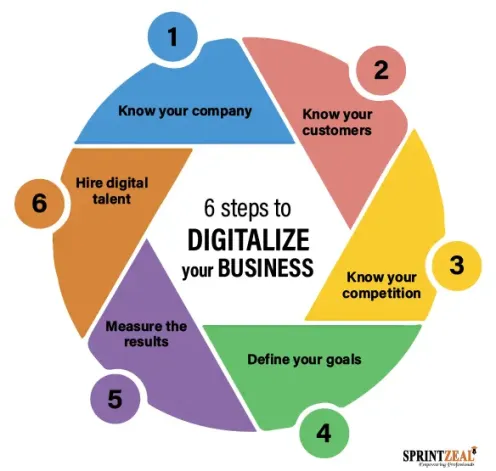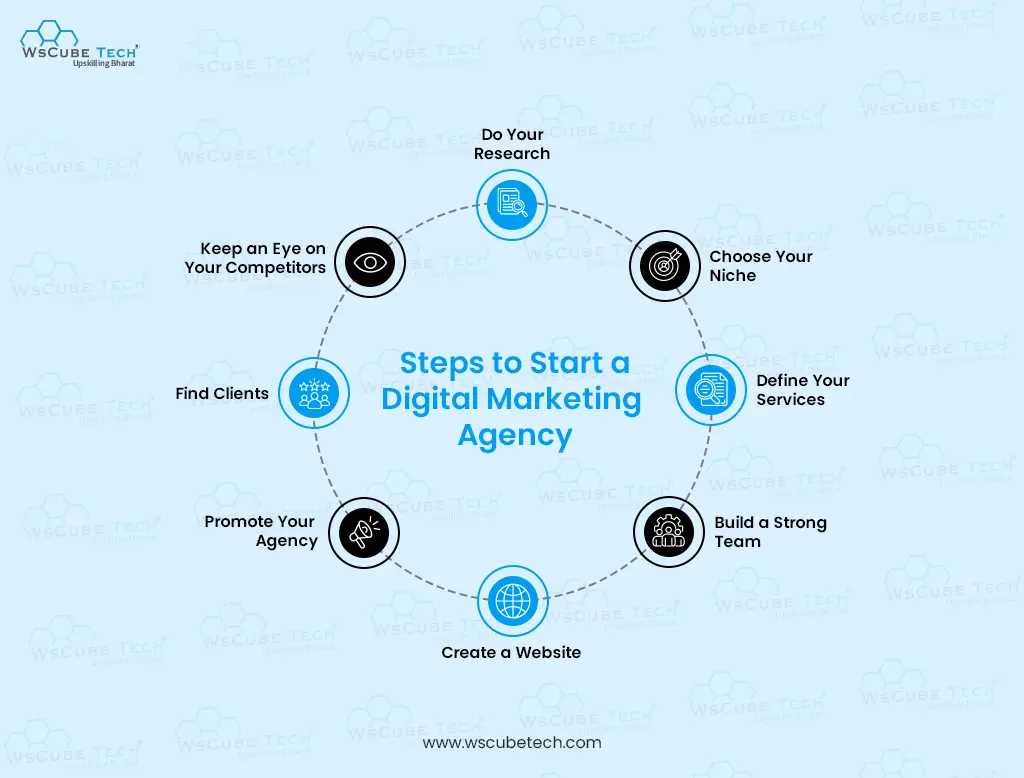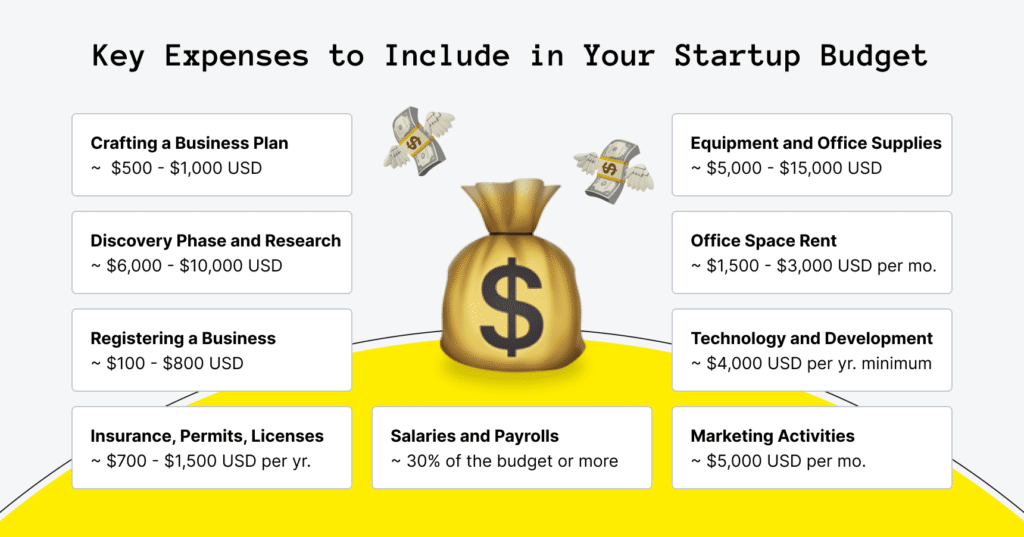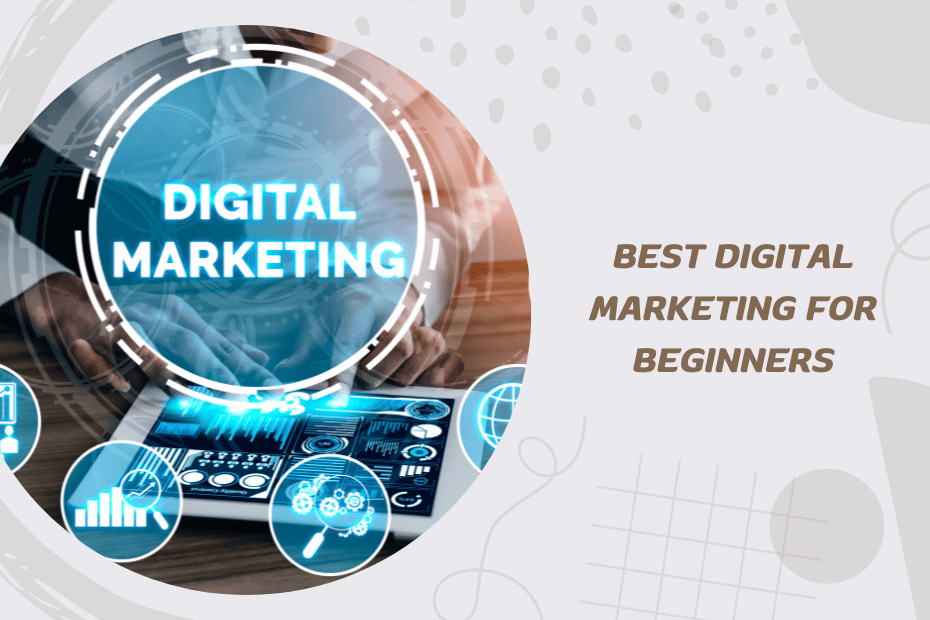What Is a Digital Business? A Simple Guide for Beginners
A digital business is any business that operates primarily online, using digital tools, platforms, or services to deliver products or services to customers. Unlike traditional brick-and-mortar businesses, digital businesses rely on the internet to function, market, and grow.
For example, selling digital products like ebooks, offering online courses, running an e-commerce store, or earning through affiliate marketing are all forms of digital business.
This guide is specially crafted to explain digital business for beginners, so let’s keep it simple: if you have access to a computer, a reliable internet connection, and the drive to learn, you already have the basic tools needed to start.
What makes digital business for beginners so appealing is that it removes many of the barriers that stop people from starting a traditional business—like high rent costs, inventory storage, or hiring full-time staff. Instead, beginners can build and grow their business from home, at their own pace, and often with minimal startup costs.
In short, a digital business allows you to:
- Work from anywhere
- Reach global customers
- Automate sales and marketing
- Scale with low overhead
Whether you’re looking to earn a side income or build a full-time career, learning the basics of digital business for beginners is your first step toward financial independence in the digital age.

How Easy Is It to Start a Digital Business for Beginners?
Starting a digital business for beginners is easier today than ever before. Thanks to free online tools, simple website builders, and step-by-step tutorials, anyone can launch a digital business with little to no prior experience.
You don’t need to be a tech expert or spend thousands of dollars to get started. In fact, many successful digital entrepreneurs began with basic skills and learned along the way. Whether you want to sell handmade products online, offer freelance services, or build a blog, the setup process is straightforward.
Here’s what makes a digital business beginner-friendly:
- Low entry barrier: You can start with just a laptop and internet connection.
- Free or low-cost platforms: Websites like Shopify, WordPress, and Etsy make setup easy.
- Plenty of learning resources: YouTube tutorials, online courses, and blog guides are widely available.
- Automation tools: Many business tasks like email marketing or order processing can be automated.
Of course, no business is completely effortless. There is a learning curve and some trial and error involved. But with consistency and curiosity, starting a digital business for beginners is highly achievable—even for someone with zero experience.
In short, if you can use social media, send emails, and follow basic instructions, you already have what it takes to begin your journey into the world of digital business.

Startup Costs: How Much Does It Take to Launch a Digital Business for Beginners?
One of the biggest advantages of starting a digital business for beginners is the low startup cost. Unlike traditional businesses that require renting a physical space, stocking inventory, or hiring staff, digital businesses can often be started with a very small budget—or even for free.
Here’s a breakdown of common startup costs:
- Domain name: Around $10–$15 per year
- Website hosting: $3–$10 per month (some platforms like Wix or WordPress.com offer free plans)
- Website builder or platform: Many tools like WordPress, Shopify, or Gumroad have affordable beginner plans
- Logo and branding: You can design your own for free using tools like Canva
- Marketing tools: Many email platforms and social media schedulers offer free versions
- Learning resources: Free tutorials and budget-friendly courses are widely available
In total, most beginners can start their digital business with as little as $50 to $100. And in some cases—like starting a YouTube channel or affiliate blog—you might not spend anything upfront at all.
For anyone looking into digital business for beginners, the low cost makes it a risk-friendly way to test ideas, build skills, and generate income without needing large capital or loans.
Remember, the focus at the beginning should be learning and experimenting—invest only what you’re comfortable with and grow as you go.

Earning Potential: Can You Make Real Money with Digital Business for Beginners?
Yes, you absolutely can make real money with a digital business for beginners—but like any business, it depends on the effort, strategy, and consistency you put in.
The beauty of digital business is that there are many income streams to choose from. Some people earn a few hundred dollars per month as a side hustle, while others scale up to full-time income or even six figures a year. It all starts small and grows over time.
Here are some common ways beginners earn money through digital business:
- Selling digital products like eBooks, templates, or online courses
- Affiliate marketing by promoting other companies’ products for a commission
- Freelancing or remote services such as writing, graphic design, or virtual assistance
- Running an e-commerce store using dropshipping or print-on-demand
- Starting a blog or YouTube channel that generates ad revenue or sponsorships
One of the biggest benefits of a digital business for beginners is scalability. Once your systems are in place—like automated sales funnels or content that ranks on Google—your income can grow without working more hours.
Of course, results aren’t instant. It may take weeks or months before you see your first earnings. But with consistency and smart strategies, your income can grow steadily over time.
In short, the earning potential is real—and it’s growing. Digital business is one of the most accessible paths to building financial freedom, especially for beginners.

How Much Time Should Beginners Expect to Spend on a Digital Business?
One of the most common questions people ask when starting a digital business for beginners is: “How much time will this take?”
The answer depends on your goals, the type of digital business you choose, and how much time you’re willing to commit. However, most beginners can get started with as little as 5 to 10 hours per week.
Here’s a simple breakdown of where your time might go in the beginning:
- Planning and research: 1–2 hours/week
- Learning new tools or skills: 2–3 hours/week
- Setting up your website or platform: 2–3 hours/week
- Content creation or marketing: 2–4 hours/week
As your digital business grows, you may choose to increase your time investment. The more time you put into building, marketing, and optimizing your business, the faster you’re likely to see results.
One key benefit of a digital business for beginners is flexibility. You can work early mornings, late evenings, or weekends—whatever fits your schedule. Plus, once your business starts to run more smoothly, many tasks can be automated or outsourced, saving you time in the long run.
In summary, beginners don’t need to commit full-time hours. A consistent weekly effort, even on a part-time basis, is enough to get your digital business off the ground and moving in the right direction.
Best Tools and Platforms to Start a Digital Business for Beginners
When starting a digital business for beginners, using the right tools and platforms can make a huge difference. Fortunately, there are plenty of options that cater to beginners, offering easy-to-use interfaces and affordable pricing.
Here’s a list of some of the best tools and platforms you can use to get your digital business up and running:
1. Website Builders:
- Wix: Known for its drag-and-drop functionality, Wix is an excellent choice for beginners who want to build a professional-looking website without any coding experience. You can start with a free plan, and the paid plans offer additional features like custom domains.
- WordPress: A highly customizable platform, WordPress is perfect for bloggers or anyone who wants to create a content-driven website. It’s free to use, though you’ll need to pay for hosting and a domain name.
- Shopify: Ideal for beginners looking to start an e-commerce business, Shopify makes it easy to set up an online store with integrated payment options and marketing tools.
2. Email Marketing Tools:
- Mailchimp: A user-friendly email marketing platform, Mailchimp offers a free plan for beginners that includes up to 500 subscribers. It’s a great tool for building an email list and sending newsletters or promotional campaigns.
- ConvertKit: Known for its simplicity, ConvertKit is a great choice if you want to automate your email marketing. It’s perfect for bloggers, creators, and digital entrepreneurs.
3. Design Tools:
- Canva: If you need to create graphics, social media posts, or marketing materials, Canva is a fantastic, easy-to-use tool. It has a free version with plenty of templates, making it beginner-friendly for digital businesses.
- Adobe Spark: Another great design tool, Adobe Spark lets you create videos, web pages, and social media posts without requiring advanced design skills.
4. Social Media Management:
- Buffer: Buffer is a simple, affordable social media management tool that allows you to schedule posts across multiple platforms. It’s ideal for beginners who want to keep their social media presence consistent without spending too much time on it.
- Hootsuite: Hootsuite offers a more comprehensive social media management solution, allowing you to monitor multiple accounts, schedule posts, and track performance.
5. E-Commerce Platforms (for selling products):
- Etsy: Perfect for beginners looking to sell handmade or vintage items, Etsy has a user-friendly platform that requires little upfront investment. It’s a great starting point for digital business owners interested in selling physical products online.
- BigCommerce: For those ready to scale their online store, BigCommerce offers more advanced features than Shopify but still remains beginner-friendly.
6. Affiliate Marketing Tools:
- Amazon Associates: One of the easiest ways to start affiliate marketing, the Amazon Associates program allows you to earn commissions by promoting Amazon products on your blog, website, or social media channels.
- ShareASale: ShareASale offers a vast network of affiliate programs across various niches, allowing beginners to find products they can promote and earn commissions from.
7. SEO Tools:
- Ubersuggest: A free SEO tool that provides keyword suggestions, backlink data, and website audit reports, Ubersuggest is perfect for beginners looking to improve their website’s search engine ranking.
- Yoast SEO: If you’re using WordPress, Yoast SEO is a must-have plugin that helps you optimize your posts and pages for search engines with its easy-to-follow guidance.
8. Freelance & Service Platforms:
- Fiverr: For beginners offering freelance services (such as writing, graphic design, or virtual assistance), Fiverr is a great platform to start earning money quickly by offering specific services.
- Upwork: Another popular freelancing platform, Upwork allows you to create a profile, bid on projects, and connect with clients globally.
By using the right tools and platforms, beginners can quickly streamline their workflow and focus on growing their digital business. Each of these tools offers an easy learning curve and flexible pricing, making them perfect for anyone just starting out.
Understanding the Learning Curve: Is Digital Business Beginner-Friendly?
When it comes to starting a digital business for beginners, it’s important to understand that there is a learning curve. While the process is accessible and many tools are designed to be user-friendly, there are still new concepts, skills, and strategies to learn.
However, the good news is that digital business for beginners is more beginner-friendly than ever. With a wealth of resources available online, you can learn at your own pace and gradually build the knowledge you need to succeed.
Here’s what to expect from the learning curve:
1. Basic Digital Skills:
- What to Learn: Creating and managing a website, understanding email marketing, and navigating social media platforms.
- Time to Learn: A few hours to a few days, depending on the complexity of the tools you’re using.
- Why It’s Beginner-Friendly: Many platforms offer drag-and-drop features, easy-to-follow tutorials, and customer support, so you don’t need advanced technical skills to get started.
2. Marketing Strategies:
- What to Learn: How to use social media, SEO (Search Engine Optimization), content marketing, and paid advertising to reach your target audience.
- Time to Learn: A few weeks to a few months to fully grasp the basics and start implementing strategies.
- Why It’s Beginner-Friendly: There are free courses, YouTube videos, and blog posts available for beginners to understand the fundamentals. Plus, many marketing tools offer built-in tutorials to guide you.
3. Time Management and Organization:
- What to Learn: How to prioritize tasks, manage your schedule, and stay consistent in growing your business.
- Time to Learn: This is an ongoing skill that improves over time.
- Why It’s Beginner-Friendly: The flexibility of digital business allows you to start part-time, and you can gradually build a routine that fits your lifestyle. Tools like Google Calendar or Trello can help you stay organized.
4. Financial Management:
- What to Learn: Understanding pricing strategies, keeping track of income and expenses, and managing business profits.
- Time to Learn: A few hours to get started with basic financial tracking tools.
- Why It’s Beginner-Friendly: Simple accounting software like QuickBooks or Wave can help you easily manage your finances without needing an accounting background.
5. Dealing with Challenges:
- What to Learn: Problem-solving and adapting to changes in the market, competition, or customer preferences.
- Time to Learn: This comes with experience, but beginners can access mentorship, community forums, and other resources for guidance.
- Why It’s Beginner-Friendly: Many entrepreneurs face these challenges, and there are plenty of blogs, podcasts, and online communities to provide advice and support.
The learning curve for digital business for beginners is manageable, especially when you take advantage of the many free resources available online. Whether you’re learning how to build a website or optimize your marketing, the key is to take it step by step and stay consistent.
In conclusion, while there will be some learning involved, digital business for beginners is designed to be accessible. With time, effort, and the right mindset, you can quickly overcome the learning curve and start seeing success in your digital business.
Is There Demand? Top Digital Business Trends for Beginners in 2025
The digital world is constantly evolving, and as we move into 2025, new trends are shaping the landscape of digital business for beginners. The good news is that there is plenty of demand across various industries, and many of these trends present exciting opportunities for those just starting out.
Here are some of the top digital business trends for 2025 that beginners should consider:
1. E-Commerce and Dropshipping
- Why It’s in Demand: Online shopping continues to grow, and dropshipping allows beginners to start an e-commerce store with minimal upfront investment. You can sell products without holding inventory or dealing with shipping, which makes it a low-risk business model.
- Opportunity for Beginners: With platforms like Shopify and WooCommerce, setting up an online store has never been easier. Beginners can choose from thousands of products to sell and target specific niches, from fashion to tech gadgets.
2. Affiliate Marketing
- Why It’s in Demand: More and more companies are leveraging affiliate programs to promote their products and services. With affiliate marketing, beginners can earn commissions by recommending products they believe in.
- Opportunity for Beginners: You don’t need your own product to start earning money. By joining affiliate networks like Amazon Associates, ShareASale, or ClickBank, you can start promoting products through your blog, social media, or website, earning passive income over time.
3. Online Courses and Coaching
- Why It’s in Demand: People are increasingly turning to online learning for personal and professional growth. The demand for educational content is higher than ever, especially in niches like technology, business, and personal development.
- Opportunity for Beginners: If you have expertise in a particular field, you can create and sell online courses on platforms like Udemy or Teachable. Alternatively, you can offer coaching services and help others through one-on-one sessions.
4. Freelance Services
- Why It’s in Demand: With the rise of remote work, there’s a growing demand for freelancers who can offer services like writing, graphic design, programming, marketing, and more.
- Opportunity for Beginners: Platforms like Upwork, Fiverr, and Freelancer make it easy for beginners to find clients and start earning money. You can offer your services on a part-time basis and gradually scale your business.
5. Content Creation (Blogging, YouTube, Podcasts)
- Why It’s in Demand: Content is still king, and there’s a huge appetite for engaging, informative, and entertaining content. Whether it’s through blogging, YouTube, or podcasts, content creators are finding ways to build audiences and monetize their content.
- Opportunity for Beginners: Platforms like WordPress (for blogging), YouTube, and Spotify (for podcasts) offer low barriers to entry. As a beginner, you can start creating content around your interests and passions, building an audience, and eventually generating revenue through ads, sponsorships, or product promotions.
6. Subscription-Based Services
- Why It’s in Demand: Subscription models are increasingly popular, as consumers prefer paying for access to valuable content or products regularly, rather than making one-time purchases.
- Opportunity for Beginners: Whether it’s a subscription box service, exclusive content membership, or a software-as-a-service (SaaS) business, beginners can leverage this trend to create recurring revenue. Tools like Patreon and Substack make it easier to set up a subscription-based model.
7. Digital Products and Print-on-Demand
- Why It’s in Demand: Selling digital products (like eBooks, design templates, or printables) and print-on-demand items (such as custom t-shirts, mugs, and posters) is a growing business model.
- Opportunity for Beginners: With platforms like Etsy and Redbubble, beginners can design and sell digital or print-on-demand products without worrying about inventory or shipping. These platforms handle the printing and shipping, making it a hassle-free option for newcomers.
Real-Life Examples of Successful Digital Businesses for Beginners
There are countless examples of digital businesses for beginners that have turned into successful ventures. One such example is Pat Flynn, who started his digital business for beginners by blogging and sharing his experiences with online business. He built a platform offering online courses, podcasts, and resources for aspiring entrepreneurs. Today, Smart Passive Income generates a significant income from affiliate marketing, online courses, and digital products.
Michelle Schroeder-Gardner began her digital business for beginners with a personal finance blog. Over time, she successfully monetized it through affiliate marketing, generating thousands of dollars every month. She also offers courses teaching others how to succeed in affiliate marketing.
Tanya Thompson turned her blog, The Happy Arkansan, into a successful digital business. Starting as a side project, she monetized it with affiliate marketing, sponsored content, and by offering digital products. Her story shows that even niche blogs can thrive.
Melyssa Griffin, a former high school teacher, created a blog and online courses around personal development and online entrepreneurship. Her business grew into a leading platform for aspiring entrepreneurs.
Jenna Kutcher shifted from offering photography services to building The Goal Digger Podcast. She expanded her digital business by offering courses, becoming a prominent figure in the online business community.
These examples show that digital businesses for beginners can grow into highly profitable ventures with the right strategy and dedication. Whether through blogging, affiliate marketing, online courses, or podcasts, there are multiple ways to turn your passion into a successful digital business. The key is to start small, learn as you go, and stay committed.
Pros and Cons of Starting a Digital Business for Beginners
Pros
- Low Startup Costs
- Flexibility and Freedom
- Scalable Growth
- Global Market Reach
- Low Overhead Costs
Cons
- High Competition
- Steep Learning Curve
- Time Commitment
- Risk of Burnout
conclusion.
Starting a digital business for beginners is one of the most accessible paths to entrepreneurship today. With low startup costs, flexible work options, and the ability to reach a global audience, it offers exciting opportunities for anyone willing to learn and take action. While challenges like competition, income fluctuation, and a steep learning curve exist, they can be overcome with dedication, the right tools, and continuous learning. If you’re ready to take control of your future and build something of your own, now is the perfect time to explore the world of digital business.
